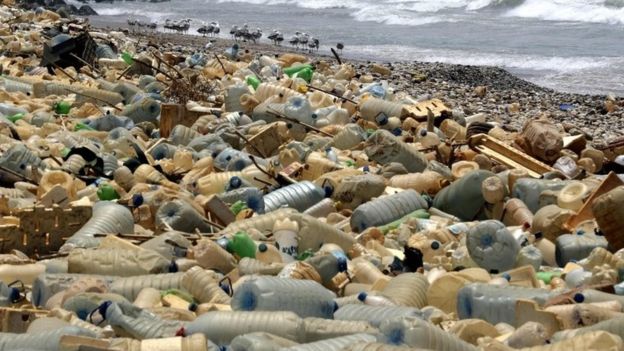We must work to reduce plastic use to save our lives – stakeholders
- Home
- We must work to reduce plastic use to save our lives – stakeholders

We must work to reduce plastic use to save our lives – stakeholders
Dr. Ebenezer Laryea, Associate Professor for Sustainable Development at the University of Northampton, UK, has urged a reduction in the use of plastics to help protect the environment.
Speaking at a stakeholder workshop in Accra, he emphasised the adverse effects of plastics on agriculture and the environment.
He said about 840,000 tonnes of plastic waste was collected annually in Ghana, out of which only 9.5% was recycled.
Dr Laryea, also the Director of Fresh Produce Impact Hub (FRESHPPACT), therefore, called for action and dialogue from players in the plastic production chain.
Fruit juice manufacturer, Blueskies, Ministry of Environment, Science, Technology, and Innovation (MESTI) and other stakeholders attended the workshop.
It was to, among other things, discuss efforts towards plastic waste management and come up with recommendations for enhancing the effectiveness of existing plastic waste management policies in Ghana.
Experts recommend individual actions such as using reusable bags, containers, and water bottles; choosing products with minimal packaging; avoiding microbeads and single-use plastics; and recycling and compost, as part of efforts to save humankind.
Ms Mary Aka, Head of Internal Audit on Environment, Health, and Safety at Blue Skies, explained some steps adopted by the company to reduce plastic waste.
She said patrons of the fruit business were often encouraged to gather bottles and hand them over to a recycling company after use.
In his remarks, Mr Thomas Narh Korley, Coordinator, Zoomlion Foundation, cited the importance of fostering “a sense of responsibility” among young people to adopt sustainable behaviours in plastic waste management.
He recommended similar workshops and seminars for pupils and youth across the country.
The workshop had representation from government, industry, academia, civil society, the private sector and environmental activists.
They participated in focused discussions on alternative for plastics, economic mechanisms, key areas of regulations, international standards, education, capacity building, monitoring and evaluation.
Plastics according to scientists, are impacting the environment, human health, and the economy.
Plastics contribute to 80% of marine pollution, harming marine life and ecosystems.
Plastic production releases greenhouse gases, contributing to climate change, while plastic waste litters oceans, rivers, and landscapes, affecting wildlife habitats.
When microplastics enter food chains, they harm marine life and human health.
Plastic waste also contaminates soil, affecting plant growth and agricultural productivity.
On human health, plastics contain toxic chemicals such as BPA, phthalates, and PFOS, linked to cancer, reproductive issues, and neurological problems.
Humans consume microplastics through food, water, and air, potentially harming their health.
Additionally, plastic pollution exacerbates respiratory problems such as asthma, while exposure to plastic chemicals increases cancer risk.
Scientists also warn that plastic chemicals disrupt hormone balances, affecting human development and reproduction.
Economically, managing plastic waste costs billions annually globally as most products are not biodegradable.
Source: GNA
- Share
Classic Ghana
Classic Ghana brings you into a fun world of arts, entertainment, fashion, beauty, photography, culture and all things in between. Let’s explore these together!







